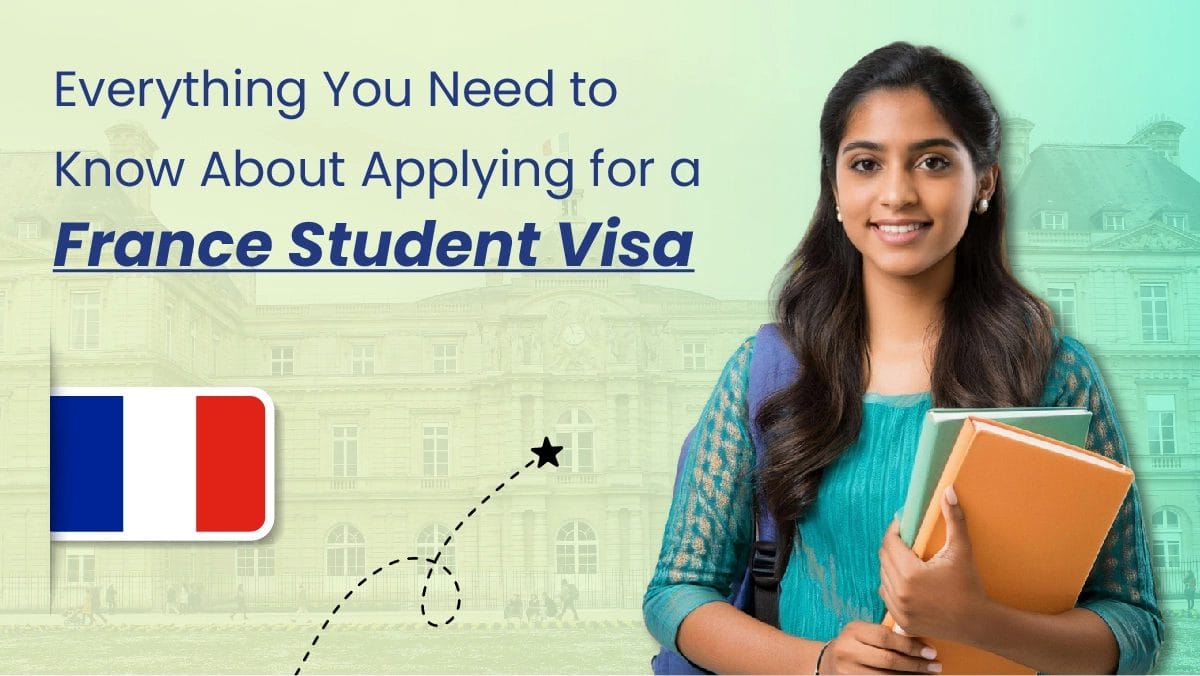
Understanding how to apply for a France student visa may seem challenging, but it’s simpler than you think. By following the necessary steps, gathering the required documents, and meeting the eligibility criteria, you can navigate the process with ease. Whether you’re just starting or looking for detailed guidance, this overview will help you learn how to apply for a France student visa. A student visa opens up incredible opportunities, so let’s take the first step toward turning your dream into reality!
Pick the right visa for your study time: Short-stay for less than 90 days, long-stay for more than 90 days, or temporary long-stay for up to a year.
Collect all needed papers early, like school admission proof, money proof, and health insurance, so your visa process isn’t delayed.
Sign up with Campus France and fill out the France-Visas online form to start your visa application easily.
Get ready for your consulate meeting by sorting your papers and practicing answers to common questions.
Learn about visa renewal rules and deadlines to keep studying in France without problems.

When studying in France, you must pick the right visa. Your choice depends on how long and why you’re staying. Here’s a simple guide to help you choose.
This visa is for programs under 90 days. It’s great for summer school or short courses. You don’t need a residence permit for this visa. But remember, it cannot be extended. Plan carefully to match its time limit.
Studying for over 90 days? Choose the long-stay visa (VLS-TS). It lasts one year and works for degrees like Bachelor’s or Master’s. After arriving, you must validate it online. This visa lets you work part-time and travel in Schengen countries.
This visa is for programs up to one year. Unlike the VLS-TS, it doesn’t need validation. It cannot be renewed, so it’s best for short-term studies. You can travel freely in Schengen countries while using this visa.
Here’s a simple comparison to explain the differences:
| Visa Type | Duration | Requirements | Validity |
|---|---|---|---|
| Short-stay visa | Less than 90 days | For short-term studies | No residence permit needed |
| Long-stay visa (VLS-TS) | More than 90 days | Requires validation upon arrival | Valid for one year, renewable |
| Temporary long-stay visa (VLS-T) | Up to 1 year | No validation needed | Non-renewable, for educational purposes |
Pick your visa based on your study plans. Whether it’s a short course or a degree, knowing these options makes applying easier.
Choosing the right visa is a crucial step in your journey to study in France. The type of visa you need depends on the length of your program and your specific goals.
Here’s how you can decide:
💡 Tip: Always check the duration and requirements of your program before applying. This ensures you pick the visa that aligns with your academic plans.
Still unsure? Think about your long-term goals. If you’re aiming for a degree or plan to stay longer, the VLS-TS offers more flexibility. For shorter commitments, the other options might suit you better. By understanding your needs, you can make an informed choice and avoid unnecessary complications.
If you want to study in France and are not from the EU, EEA, or Switzerland, you’ll need a student visa. This rule applies to most international students, including those from India and the United States. Even for short programs like summer courses, the right visa is required.
If you’re from the EU, EEA, or Switzerland, no visa is needed. You can join a French university without extra paperwork. Still, check if your program asks for specific documents, like proof of enrollment or financial details.
France accepts students of all ages, but some programs have age limits.
Here’s a simple guide:
| Program | Age Limit |
|---|---|
| Bachelor’s Degree | 18–30 years old |
| Master’s Degree | 21–35 years old |
| PhD Programs | 25–35 years old |
| Foundation Courses | 17–21 years old |
| Language Courses | Usually 16 and older |
| Vocational Programs | Depends on the school |
If you’re under 18, you might still join language or foundation courses. Most programs need proof of education, like a high school diploma or degree, based on the study level.
💡 Tip: Always check the age and education rules for your program before applying. This helps you meet the visa requirements.
To get a student visa, you must show proof of acceptance into a French school or university. An official acceptance letter is required. It should include program details, start and end dates, and confirm it’s full-time.
Here’s what you’ll need:
| Requirement | Details |
|---|---|
| Proof of Admission | Official letter from a recognized school. |
| Financial Proof | Bank statement showing €615/month (about ₹55,000). |
| Valid Passport | Must be valid for at least one year. |
| Academic Documents | Certificates and transcripts. |
| Health Insurance | Covers the visa period. |
| Visa Application Fee | Around €50–€99. |
Top schools, like the University of Paris, are competitive. For example, undergraduate programs accept 15–20% of applicants, while some master’s programs accept only 10–15%. Strengthen your application by meeting all program needs, like GPA, language tests, or interviews.
📌 Note: If your program is in English, you may need IELTS or TOEFL scores. Most programs ask for an IELTS score of 6.0–7.0 or a TOEFL score of 80–100.
Getting a France student visa may feel hard, but breaking it into steps makes it easier. Follow this guide to complete the process.
Start by signing up with Campus France. This is the official platform for international students in France. It links you to the French education system and ensures your application is handled properly.
Here’s how to do it:
💡 Tip: Start early to avoid delays. Completing Campus France registration on time helps your visa process go smoothly.
If you’re confused about this step, Apex Education and Overseas Consultancy can help. They are experts in student visa applications and ensure you don’t miss anything important.
After registering with Campus France, apply for your student visa through the France-Visas website. Follow these tips to complete this step:
The form asks for details about your program, money, and housing in France. Check everything carefully before submitting.
📌 Note: Save a digital copy of your form and payment receipt. You’ll need them for your visa appointment.
Apex Education and Overseas Consultancy can guide you in filling out the form. Their team ensures all details are correct and complete.
After finishing the online form, book an appointment with the French consulate or visa center in your country. This is where you’ll submit your papers and attend an interview.
Here’s what to do:
💡 Tip: Dress nicely and arrive on time. Being prepared shows you’re serious about studying in France.
If you’re nervous about this step, Apex Education and Overseas Consultancy can assist. They help with organizing papers and practicing for interviews to make sure you’re ready.
After booking your appointment, it’s time to submit your application and attend the interview. This step is very important, so being ready can help a lot. Follow these tips to do well:
💡 Tip: Use a folder to keep your papers neat and easy to find.
Get Ready for the Interview
The interview is your chance to explain why you deserve the student visa. The officer may ask about your studies, money, and future plans. Practice answering questions clearly and truthfully.
Common questions include:
Why did you pick this program and school?
How will you pay for your studies?
What will you do after finishing the program?
📌 Note: Be polite and confident. A good attitude can make a big difference.
💡 Pro Tip: Keep a copy of your application and papers for yourself.
After the interview, the consulate will review your application. If everything is fine, you’ll move to the next step.
Once the interview is done, it’s time to track your application and wait for your visa.
Here’s what to do:
💡 Tip: If there’s a mistake, tell the consulate right away to fix it.
By following these steps, you’ll be ready to study in France. If you need help, Apex Education and Overseas Consultancy can guide you through the process and make it easier.

To apply for a French student visa, you need the right papers. Missing even one can slow things down. Let’s look at the key documents and how to prepare them.
You must show proof of acceptance into a French school. This is an official letter from your school confirming your admission. The letter should include the program name, start and end dates, and confirm it’s full-time.
Here’s what to check before submitting your letter:
💡 Tip: If your program is in English, the letter may need to mention this. Check with your school to be sure.
This letter is very important. Without it, you can’t start your visa application.
Your passport is your most important travel document. It must be valid for at least three months after your stay in France. If it’s about to expire, renew it before applying.
Here’s what you’ll need:
📌 Note: Bring two extra photos. You might need them for other paperwork in France.
Having these ready will help avoid delays in your application.
You must prove you can pay for your stay in France. This includes showing you have enough money and a place to live.
You need to show you have at least €615 per month for your stay.
Here’s how you can prove it:
You also need to show where you’ll live in France. This could be:
💡 Pro Tip: If you don’t have permanent housing yet, book temporary housing and show the reservation. Update your visa file later with permanent details.
Having clear financial and housing proof shows you’re ready for life in France.
By preparing these documents early, you’ll make the visa process easier. If you’re unsure about anything, Apex Education and Overseas Consultancy can help you every step of the way.
When applying for a France student visa, health insurance and other papers are just as important as your acceptance letter or money proof. These show you’re ready to live in France and meet the rules. Let’s break it down so you know what to prepare.
Health insurance is required for all international students in France. It helps you get medical care if you’re sick or in an emergency. It also protects you from big medical bills. Plus, it’s a must-have for your visa.
Here’s what to know about health insurance:
💡 Tip: Not sure which insurance to choose? Ask your school. Many schools suggest trusted providers for students.
Besides health insurance, you’ll need more papers to finish your visa application. These prove you’re ready to study and live in France. Here’s what you’ll need:
Proof of Identity
Bring papers like your birth certificate or marriage certificate (if married). These must be translated into French or English by a certified translator.
📌 Note: Some consulates may ask for a special stamp (apostille) on these papers. Check your country’s rules.
💡 Pro Tip: Use refundable tickets or a flight reservation service to avoid losing money if plans change.
Police Record
Some consulates may ask for a police record to show you have no crimes. This paper should be recent (within three months).
School Records
Bring copies of your past school papers, like diplomas or degrees. These support your admission proof and show your education history.
Language Test Scores
If your program needs language proof, include your IELTS, TOEFL, or DELF/DALF scores. Make sure they meet your school’s requirements.
Vaccination Proof (if needed)
Some schools may ask for vaccine records, like for COVID-19 or measles. Check with your school if this applies to you.
Organizing your papers can save time and stress. Here’s how to do it:
✈️ Final Reminder: Check the consulate’s list before your appointment. Missing one paper can delay your visa.
By getting your health insurance and papers ready early, your visa process will be easier. If you’re unsure, Apex Education and Overseas Consultancy can help you every step of the way.
To apply for a France student visa, you must pay a fee. The cost depends on your age. Here’s a simple table:
| Age Group | Visa Fee (€) |
|---|---|
| Adults | 90 |
| Kids (6-12 years) | 45 |
| Kids under 6 years | Free |
Most students pay €90. If you’re traveling with young kids, their fees might be less or free. Always check the exact fee before applying.
💡 Tip: Save your payment receipt. You’ll need it at your visa appointment.
Apart from the visa fee, there are other costs. These include Campus France registration and travel insurance.
Other small costs include document translations, copies, and courier services. These can add up, so plan your budget carefully.
📌 Note: Some schools may offer discounts on insurance or help with Campus France fees. Ask your school for details.
Paying for your visa and related fees is easy. Most consulates accept credit cards, debit cards, or bank transfers. Some may take cash, but confirm this first.
Refund rules vary. Visa fees are usually non-refundable, even if denied. Campus France fees might be refunded in special cases, like program cancellations. Always read the rules before paying.
💡 Pro Tip: Check the consulate’s website for payment methods and refund details to avoid issues.
By knowing these costs and planning ahead, you can manage your money well. If you’re unsure about fees, experts like Apex Education and Overseas Consultancy can guide you.
If your program is over a year, you’ll need a residence permit. After arriving in France, validate your long-stay visa (VLS-TS) within three months. This is done online on the OFII (French Office for Immigration and Integration) website. Once validated, your visa works as a temporary residence permit.
For programs lasting more than a year, renew your residence permit. Visit your local prefecture (government office) two months before your visa ends. Bring your passport, enrollment proof, financial documents, and housing details.
💡 Tip: Always keep copies of your documents. They may be needed later for renewals or other applications.
Knowing the language helps you succeed as a student in France. Many courses are in French, so basic French skills are often needed. If your course is in English, show proof of English skills with tests like IELTS or TOEFL.
Want to learn French? Take language classes before or after arriving. Basic French helps with daily tasks like shopping or using buses. It’s also a great way to meet locals and make friends!
📌 Note: Some schools provide free or low-cost French classes for international students. Ask your school for details.
Students can work part-time to earn money. France allows students to work up to 964 hours yearly (about 20 hours weekly). Jobs can be on campus or in nearby businesses.
To work, you’ll need a valid residence permit and a bank account for payments. Common jobs include tutoring, retail, or working in cafes. These jobs help you earn money, learn the language, and understand French culture better.
💡 Pro Tip: Don’t let work affect your studies. Focus on your education first.
If your studies in France go beyond your visa, you must renew it. Don’t worry—it’s simple if you plan early. Follow these steps to make it easy.
Start renewing two months before your visa ends. This gives you enough time to prepare everything. Waiting too long can cause problems, so set a reminder early.
💡 Tip: Check your visa’s end date when you arrive in France. Staying aware of deadlines helps avoid stress.
Once approved, you’ll get your new residence permit. This lets you keep studying without issues. If you have trouble, ask your school’s international office or experts like Apex Education and Overseas Consultancy for help.
✈️ Final Reminder: Keep your new permit safe. You’ll need it for travel, work, and other important tasks.
By following these steps, you can renew your visa easily and focus on your studies.
Getting a France student visa doesn’t have to be hard. Start early, collect your papers, and follow the steps from Campus France and the French consulate. This will make the process simple and less stressful.
💡 Pro Tip: Keep your papers neat and check them twice to avoid problems.
If you’re confused about any step, Apex Education and Overseas Consultancy can help. Their team gives expert advice to ensure you meet all rules and deadlines. With their help, you can get ready for your exciting trip to France!
The processing time depends on the type of visa. Short-stay visas usually take 2–3 weeks, while long-stay visas may take up to 6 weeks. Apply early to avoid delays.
💡 Tip: Start your application at least three months before your program begins.
Yes, you can! France allows students to work up to 20 hours per week during the academic year. This helps you earn extra money and gain work experience while studying.
📌 Note: Make sure your studies remain your top priority.
Not always. Many programs are taught in English, especially at the Master’s level. However, learning basic French can make daily life easier and help you connect with locals.
💡 Pro Tip: Check your program’s language requirements before applying.
If your visa is denied, you can appeal the decision or reapply. Review the reasons for denial, fix any issues, and submit a stronger application. Seeking expert advice can improve your chances.
✈️ Final Reminder: Apex Education and Overseas Consultancy can guide you through this process.
Yes! A France student visa allows you to travel within the Schengen Area. You can visit 26 European countries without needing additional visas.
📌 Note: Always carry your passport and visa when traveling.
